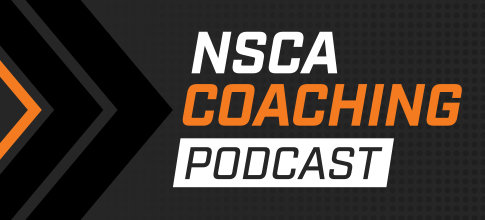NSCA’s Coaching Podcast, Episode 17: Andy Galpin
by Scott Caulfield and Andy Galpin
Coaching Podcast
November 2017
Andy Galpin, Associate Professor and Co-Director of Center for Sports Performance at Cal State Fullerton, talks to the NSCA Head Strength and Conditioning Coach, Scott Caulfield, about the roles of science and technology in sport.
Andy Galpin, PhD, is a tenured Professor in the Center for Sport Performance at California State University, Fullerton. Galpin received an undergraduate degree in Exercise Science from Linfield College, a Master’s Degree in Human Movement Sciences from the University of Memphis, and a PhD in Human Bioenergetics from Ball State University. He currently teaches and runs the Biochemistry and Molecular Exercise Physiology Lab at California State University, Fullerton.
Follow Andy on Twitter: @DrAndyGalpin | Find Scott on Twitter: @scottcaulfield
Show Notes
“I really hate it when the scientists say, ‘It’s my job to give them the science. It’s their job to read it.’” 5:35
“You need to adjust and deliver to them in a message they can deliver.” 5:47
“We’ve only got a few more years, or maybe 10 more years, when information itself is no longer a commodity.” 6:26
“I can find literally anything I need to know online, but what I can’t find is somebody to walk me through, somebody to show me what it even looks like. So in my mind, the value of a coach is going to explode when the robotics really start to take over.” 6:38
“I thought, if I can learn those advanced skills and still bring those back to training questions… We could answer some really cool questions.” 8:35
“I barely passed chemistry as an undergrad and here I am, I have a PhD in molecular biochemistry.” 9:37
“I personally identify as a coach than anything else.” 9:56
“You’re not going to say you took a class from Andy Galpin and don’t know the difference between powerlifting and weightlifting.” 12:32
“I’m going to always, as long as I can, give back to this field as much as possible.” 17:45
“There’s so much technology in the training and performance field and there’s only more coming, we want to do what we can to help people understand how technology can be helpful or it can cause harm.” 21:01
“They can be helpful but they can also be problematic if you’re outsourcing your own coaching intelligence to some piece of data.” 21:28
“If you think it’s bad with technology now, just wait.” 23:15
“We need to have an infrastructure in both our coaching practice and our own personal health that allows us to deal with things when it becomes very bad.” 23:55
“There’s a difference between using technology as a task and letting it become a task master.” 25:28
Reporting Errors: To report errors in a podcast episode requiring correction or clarification, email the editor at publications@nsca.com or write to NSCA, attn: Publications Dept., 1885 Bob Johnson Dr., Colorado Springs, CO 80906. Your letter should be clearly marked as a letter of complaint. Please (a) identify in writing the precise factual errors in the published podcast episode (every false, factual assertion allegedly contained therein), (b) explain with specificity what the true facts are, and (c) include your full name and contact information.
- Privacy Policy
- Your Privacy Choices
- Terms of Use
- Retraction and Correction Policy
- © 2026 National Strength and Conditioning Association
